SELF-REGULATION, EMOTION EXPRESSION & CLASSROOM ...
SELF-REGULATION, EMOTION EXPRESSION & CLASSROOM ...
SELF-REGULATION, EMOTION EXPRESSION & CLASSROOM ...
You also want an ePaper? Increase the reach of your titles
YUMPU automatically turns print PDFs into web optimized ePapers that Google loves.
when other kids are absent, seeks challenges, is a mature child, enjoys “playing school”;<br />
imitates the teacher, interested in teacher as a person; Miller et al., 2002); (b) on-task<br />
classroom involvement (e.g. The child follows teacher’s directions, uses classroom<br />
materials responsibly, listens carefully to teacher’s instructions and directions, is<br />
interested in classroom activities, responds promptly to teachers requests, if child’s<br />
activity is interrupted, he/she goes back to the activity); and (c) positive orientation to<br />
school activities (e.g. The child is cheerful at school, approaches new activities with<br />
enthusiasm, laughs or smiles easily, is comfortable approaching the teacher, is slow to<br />
warm up to the teacher; Betts & Rotenberg, 2007; Ladd et al., 2000; Valeski & Stipek,<br />
2001; See Appendix 2).<br />
The revised factor structure for the three TRSSA subscales was as follows: On-Task<br />
Classroom Involvement (OTI; α = .88), Maturity (MA; α = .80), and Positive Orientation<br />
(PO; α = .80; Betts & Rotenberg, 2007). For the current investigation, I will utilize these<br />
data to capture preschool children’s OTI at time 2. I was able to replicate the high<br />
reliability for OTI (α = .87) using the data from the current investigation. The primary<br />
purpose for focusing on this one factor stems from the fact that OTI is regarded by many<br />
psychologists as the most relevant to school success; children who are engaged in<br />
classroom-appropriate tasks have been found to demonstrate increased academic<br />
performance (Alexander & Entwistle, 1988).<br />
The Preschool Learning Behavior Scale (PLBS). The previous literature has clearly<br />
established that learning behaviors are observable, teachable and malleable<br />
42



![[Sample B: Approval/Signature Sheet] - George Mason University](https://img.yumpu.com/21978828/1/190x245/sample-b-approval-signature-sheet-george-mason-university.jpg?quality=85)
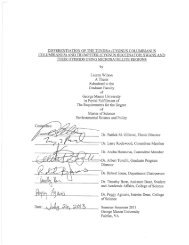
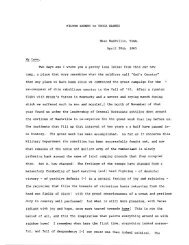
![[Sample B: Approval/Signature Sheet] - George Mason University](https://img.yumpu.com/18694905/1/190x245/sample-b-approval-signature-sheet-george-mason-university.jpg?quality=85)
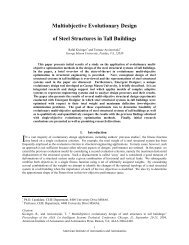
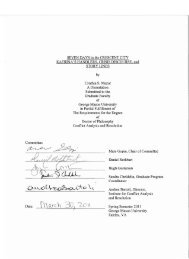
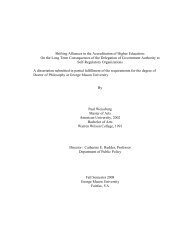
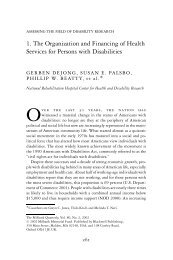
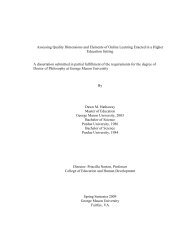
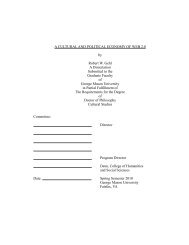
![[Sample B: Approval/Signature Sheet] - George Mason University](https://img.yumpu.com/18694552/1/189x260/sample-b-approval-signature-sheet-george-mason-university.jpg?quality=85)
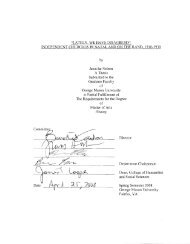
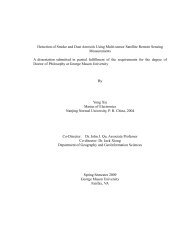
![[Sample B: Approval/Signature Sheet] - George Mason University](https://img.yumpu.com/18694474/1/190x245/sample-b-approval-signature-sheet-george-mason-university.jpg?quality=85)